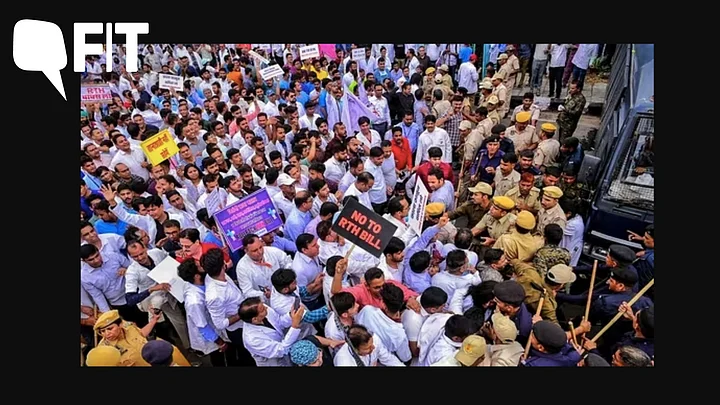Doctors in Rajasthan are up in arms against their government after the unanimous passage of the Rajasthan Right to Health (RTH) Bill by the state Assembly on 21 March 2023, which awaits the assent of the governor. The widespread protest threatens to derail the healthcare in the state.
Doctors are on the warpath for the last two weeks and have vowed to continue their stir until the government withdraws the legislation in toto.
Around a lakh of doctors and 2,500 private hospital operators across the state continue to agitate. The anger in medical community has led to closure of several private healthcare establishment leading to crippling of the medical services in this state.
In 1989 the Supreme Court of India in Parmanand Katara vs. Union of India has held that Article 21 of the Constitution casts the obligation on the State to preserve life. It has further held that every doctor whether at a government hospital or otherwise has the professional obligation to extend his services with due expertise for protecting life.
However, the judgment is silent on who would bear the expense of the emergency treatment in private hospitals. Now in the Rajasthan Right to Health Act several ambiguously worded provisions have made the matters more complex.
Definition Of Emergency: What Patient Thinks Vs What Doctor Assesses
In itself, the Right To Health is a misnomer because the Act only confers the right to treatment. Right to health is an all-encompassing right viz. Right to safe drinking water, to proper sewage disposal, to wholesome food, to freedom from air, water and noise pollution, to shelter in inclement weather and in natural disasters etc. And the responsibility of providing this rests on the shoulders of the State.
Unfortunately, waters have been muddied by some commentators including some in the mainstream media, who apparently have not even gone through the bill. There are three contentious points.
First, the variance in the definition of emergency by the State and perception of the same in the mind of the patient, which in actuality could be completely different on the ground, after assessment by the doctor.
Especially when the treatment as a matter of right is free, any and every symptom is likely to be presented as an emergency, which eventually can be decided only after detailed examination.
There is a dire need to distinguish between urgent and emergent care. For example, a normal delivery is a matter of urgency but not necessarily of emergency.
Conversely, a simple looking headache could potentially be the harbinger of a serious underlying disease which can be decided only by the medical practitioner.
The Reimbursement to Doctor
Second is the issue of reimbursement to the doctor or healthcare establishment. In the current form the Act, there is only a mention of entitlement of the healthcare provider to receive requisite fee and charges or proper reimbursement from the state government.
One of the ‘Obligations of Government’, just states that ‘Appropriate budget would be provided’ by the state. Historically, the experience of most private empanelled service providers under several government insurance schemes, is that the payment by the government is delayed for years on end and eventually only a part payment is received, on one or the other pretext, making any such provision by the private healthcare providers, a non-viable proposition.
Overarching Powers
Third, in the Act, there is a provision of establishing various state and district health authorities with overarching and unbridled powers, especially in regard to bar of jurisdiction, wherein ‘No Civil Court shall have jurisdiction to entertain any suit or proceeding in respect of any matter which the state health authority or district health authority, as the case may be, constituted under this act is empowered by or under this act to determine’.
Also, the government and the said health authorities are protected against any lawsuit or legal proceeding for anything done or intended to be done in good faith. By virtue of these powers, a vice like control over an already over regulated private healthcare would go in the hands of the bureaucrats.
Further, it would give rise to increase in corruption, nepotism and red tape leading to a dysfunctional healthcare.
The implications of enforcing this Act in the current form are going to be significant and would result in severe compromise in the quality of healthcare because of overburdening of the private clinics with non-emergent cases shrouded as 'emergencies.'
The solution probably lies in clear categorisation of healthcare providers and healthcare establishments who are willing to provide such an emergency care under the terms and conditions agreed by the said providers so that there is no ambiguity in the patients’ mind as to whom they can approach in an emergency.
Further, there must be an unambiguous commitment to reimburse the doctor for the services provided, on the rates which are realistic and not unsustainable, to say the least.
If the law in its present state is enforced without addressing the contentious issues, the fear is that the very patients who deserve the Emergency healthcare the most, would be denied the same.
(Dr Ashwini Setya is the Adjunct Professor in Gastroenterology, ESIC Medical College, Faridabad, and Senior Consultant with Medanta Institute of Digestive & Hepatobiliary Sciences, New Delhi. Dr Setya is also an advisor and consultant in Medical Law and Ethics. He can be reached at ashwini.setya@gmail.com. This is an opinion piece and the views expressed above are the author’s own. The Quint neither endorses nor is responsible for the same.)

